Proof of Residency Letter Template from Family Member
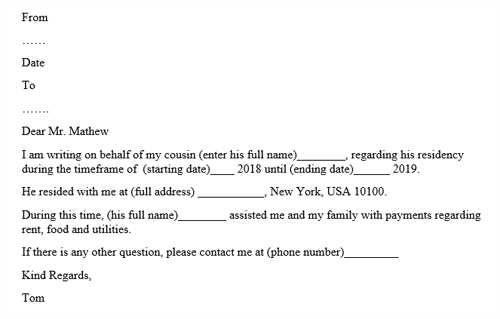
When you need to validate your place of residence, an official document can be required. This type of written confirmation is often requested by organizations, agencies, or institutions to ensure that an individual is living at a particular address. Such a statement can be essential for various processes, including applications for government services, financial support, or legal matters.
The document in question can be provided by someone close to you, who can affirm your living arrangements. It serves as a formal declaration to confirm that you are residing at a specific location, offering the necessary details for any institution to verify your claim. The person vouching for your address may include important facts that make the statement legally valid and accepted.
In this guide, we will explore how to create a concise and credible document, ensuring that all critical information is included. Whether for personal, legal, or professional purposes, knowing how to draft such a confirmation can save time and effort when submitting it to the relevant authorities.
Why You Need a Residency Verification
In many situations, confirming where you live is crucial for processing various requests. Whether applying for financial assistance, enrolling in a school, or dealing with legal matters, many institutions require assurance that you are residing at a specified address. This confirmation is not just a formality but a necessary step to verify your eligibility for certain services or benefits.
Having an official document to prove your current living situation can smooth the process of applications or claims. It provides clear, concrete evidence that you are settled at a specific location, helping to avoid misunderstandings or delays. This type of confirmation can be especially important when other forms of documentation, such as utility bills or rental agreements, may not be available or applicable.
Understanding the Importance of Address Proof
Establishing your current living situation is often a critical step in many administrative and legal processes. The need to confirm where you live extends beyond simply providing a utility bill or a lease agreement. Certain situations require additional documentation to validate your address, ensuring that the information on file matches your actual place of residence.
Address verification is necessary for a wide range of purposes. It acts as an official endorsement that supports your identity, confirming that you are settled at a given location. This can be especially important in contexts such as:
- Government assistance programs
- Banking services and credit applications
- Insurance claims or applications
- Legal matters or disputes
Without proper documentation, institutions may have difficulty processing your requests, potentially delaying or even rejecting applications. The importance of having clear and accepted evidence of your living situation cannot be overstated when dealing with formal procedures.
Why Address Confirmation Matters
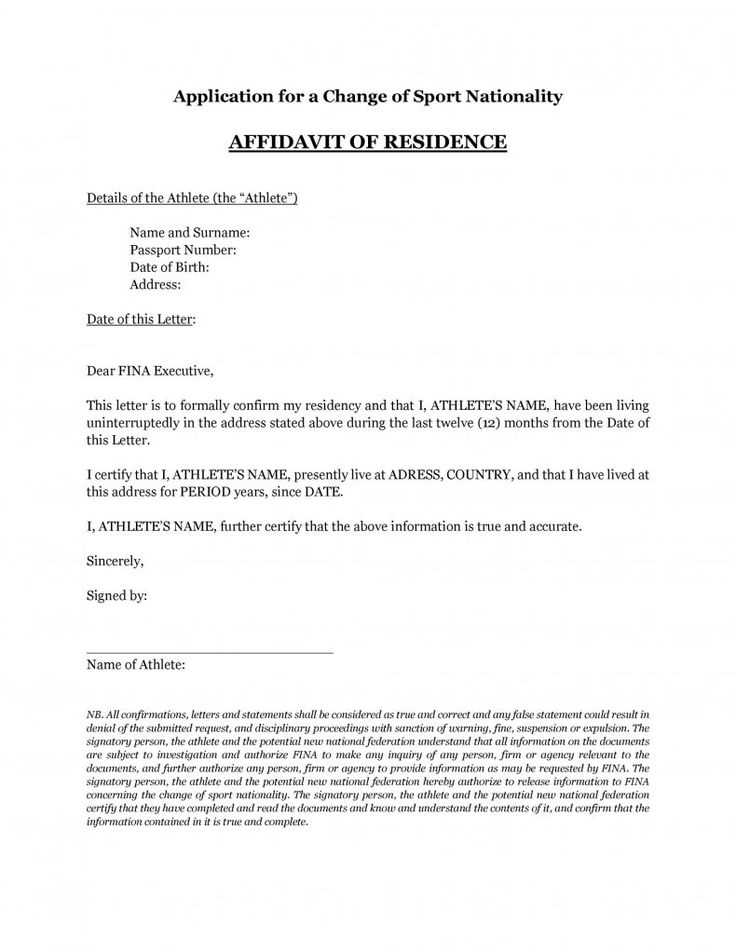
In many cases, having a reliable source vouch for your address provides additional credibility and minimizes the risk of fraud or misrepresentation. When an official document is required, it often needs to be legally binding or recognized by institutions, adding a layer of legitimacy to your application.
Common Challenges in Address Confirmation
While it may seem straightforward, providing proof of your address can become tricky if you don’t have the standard documentation, such as utility bills or rental agreements. In these cases, an alternative method of confirmation, like a written statement from someone you live with, can serve as an appropriate substitute, helping to fulfill the requirement without additional complications.
How to Draft a Family Member Letter
Creating a formal document to confirm your living situation can be a simple task if you know what to include. The goal is to provide clear, concise information that establishes your current address and the relationship between the person writing the statement and yourself. By following a straightforward structure, you can ensure that the letter meets the necessary criteria for acceptance by authorities or institutions.
To draft an effective statement, it’s essential to include several key elements that verify both the details of your address and the authenticity of the declaration. These components will make the document official and credible:
- Personal Information: Include the full name, contact details, and relationship to you of the person writing the statement.
- Address Confirmation: Clearly state your full address, including any relevant apartment or unit numbers.
- Duration of Stay: Specify how long you have been living at this address, adding any relevant dates or timeframes.
- Affirmation Statement: The person should affirm that you live at the provided address and provide a brief explanation of how they know this to be true.
- Signature and Date: Include the signature of the person providing the statement and the date of writing to ensure the document is current.
Important Considerations
Make sure the document is written clearly and without ambiguity. A well-structured and honest statement can help avoid complications. Double-check the details to ensure the correct address and dates are included. If necessary, have the document notarized to add further legitimacy to the confirmation.
Final Steps
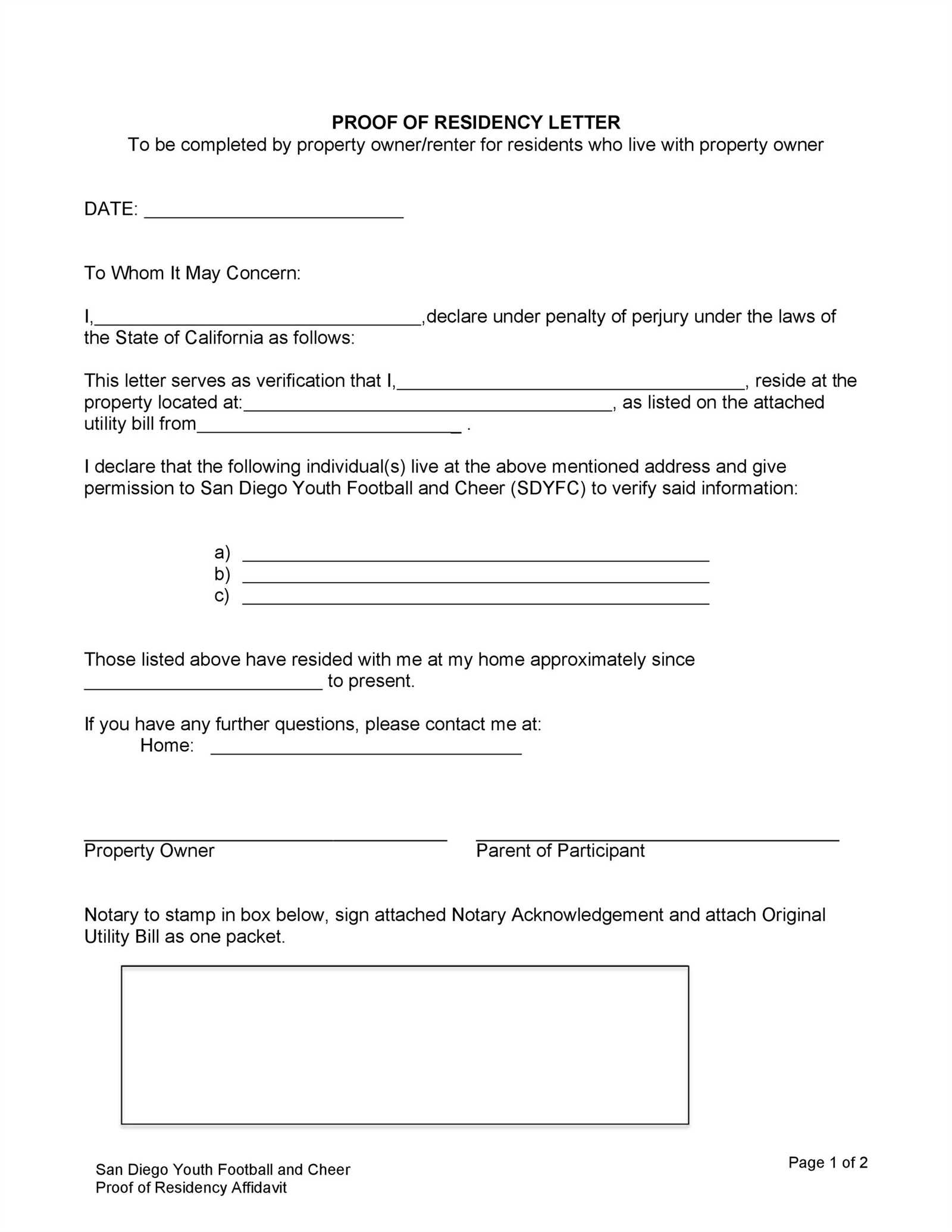
Once the letter is drafted, review it for accuracy before submission. You may need to attach additional documents, such as a government-issued ID, to accompany the statement and further substantiate your claim. Always check with the institution requesting the documentation to ensure they have no specific requirements.
Key Elements for Writing a Valid Document
When drafting a statement to confirm your living situation, it’s essential to include specific components that make the document both accurate and legally acceptable. These key details help verify that the information is genuine and reliable. A well-structured document will ensure that it meets the requirements of any organization or authority requesting it.
Here are the crucial elements to include in the written statement to make it valid:
- Clear Identification of the Individual Writing the Statement: Full name, contact details, and relationship to the person needing the confirmation.
- Specific Address Information: The complete address where the individual resides, including apartment numbers if applicable.
- Duration of Stay: The length of time the person has lived at the stated address, with relevant dates.
- Affirmation of Truthfulness: A declaration that the information is correct, including how the person knows the individual’s living situation.
- Signature and Date: A dated signature to confirm the document’s authenticity and current validity.
Additional Information
If necessary, additional details may be required, such as a notary’s seal or supporting documents that further verify the information. This can add a layer of credibility, especially for legal or official purposes. Always ensure that the statement is complete and free from errors to avoid complications during processing.
Making the Document Legally Binding
For a statement to be legally binding, ensure that it follows any specific guidelines set by the requesting institution. Depending on the requirement, having the document notarized or attaching supplementary proof may be necessary for full acceptance.
What Information Should Be Included
To ensure that a statement confirming your address is complete and accepted, it’s important to include several key pieces of information. These details provide clarity and help the institution requesting the documentation to process the request efficiently. A well-rounded document will leave no room for doubt about your living situation or the authenticity of the statement.
Here is the essential information that should be incorporated:
- Full Name and Contact Details: Include the name and contact information of the person who is providing the statement, as well as their relationship to you.
- Address Confirmation: State your full residential address, including any apartment or unit numbers, if applicable.
- Duration of Stay: Provide the time period during which you have been living at the specified address, including start dates and, if possible, end dates.
- Affirmation of Living Situation: A statement from the person confirming that you live at the listed address and the basis for their knowledge of your situation.
- Signature and Date: The document should be signed by the person providing the information, with the date clearly stated to establish the document’s validity at the time of submission.
Additional Details to Strengthen the Statement
While the basics outlined above are crucial, some situations may require extra information, such as additional verification or supporting documentation. For example, adding a photocopy of a government-issued ID or proof of relationship may be necessary for certain legal or administrative purposes. Always confirm what additional documents might be required by the requesting entity.
Ensuring Accuracy and Clarity
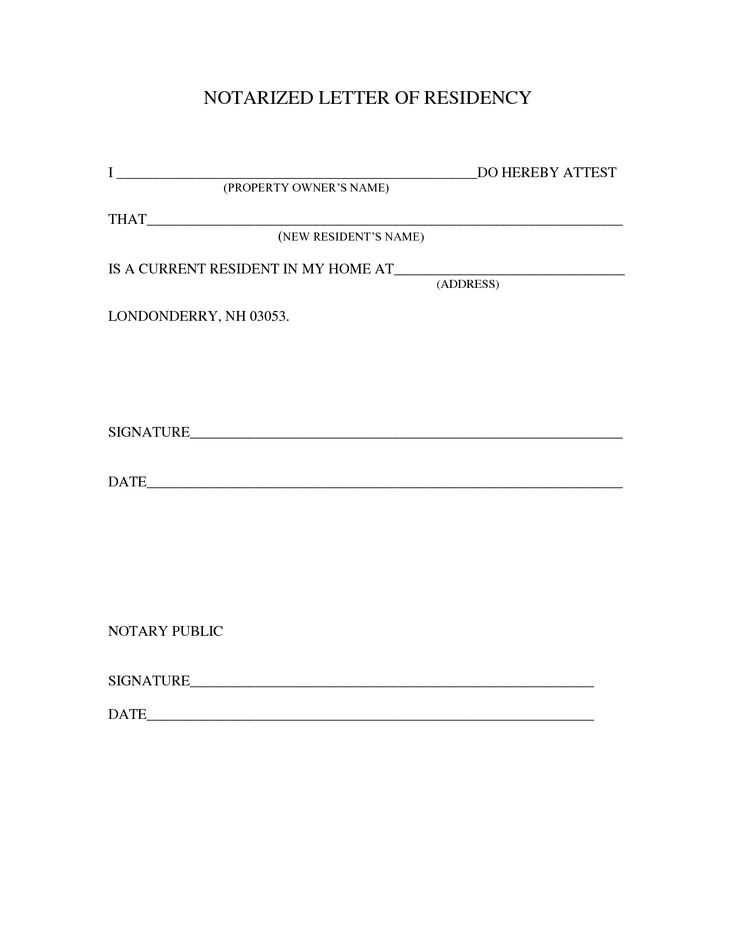
All the details should be accurate and written clearly. Avoid using vague terms or leaving out important facts. A detailed and transparent statement will help avoid unnecessary delays and complications when the document is reviewed.
Essential Details for Residency Confirmation
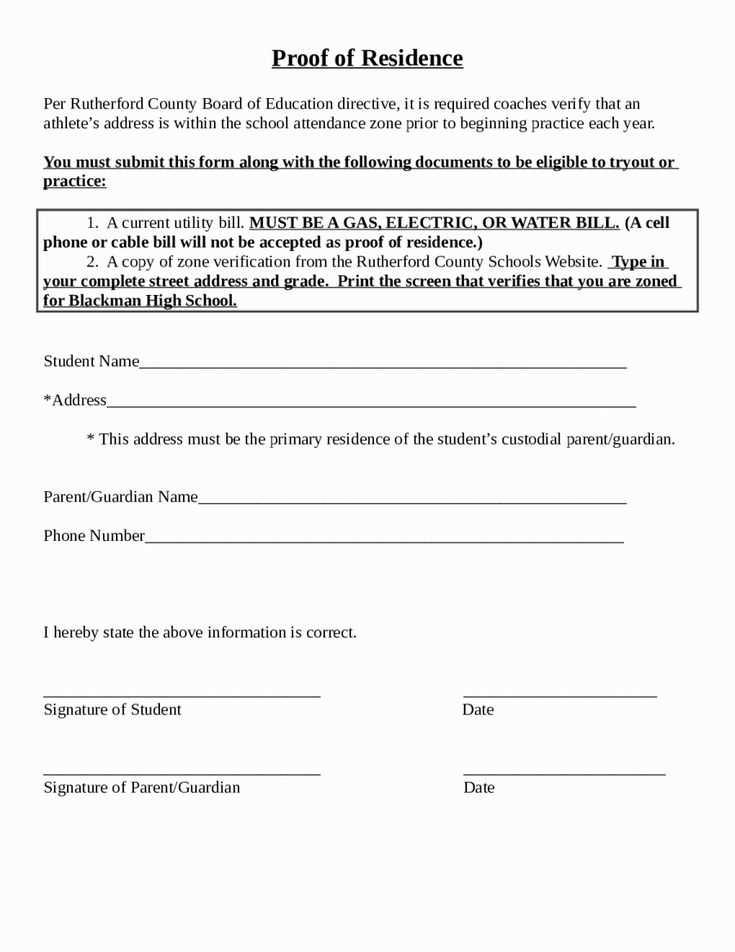
When confirming someone’s living arrangements, it is vital to include specific information that will make the statement legitimate and credible. The details provided should be clear and thorough to ensure the recipient can easily verify the provided information. Below are the essential components that should always be included to strengthen the confirmation.
| Detail | Description |
|---|---|
| Full Name | The full name of the individual providing the confirmation, along with their contact information. |
| Address | The complete residential address, including unit or apartment number, street name, city, and postal code. |
| Living Duration | The length of time the person has lived at the provided address, including start dates and if applicable, end dates. |
| Affirmation | A clear statement confirming the individual’s residence at the listed address, including how the person knows this to be true. |
| Signature & Date | The signature of the person providing the information and the date the statement was written. |
By ensuring that all of these elements are included, you can create a reliable and official document that will be accepted for various legal, financial, and administrative purposes. Providing precise and accurate details is essential to avoid any complications during the verification process.
Common Situations Requiring Proof of Address
There are various situations in which confirming someone’s current living location is necessary. This information is often requested by institutions or authorities to verify that an individual is residing at a particular address, ensuring that records are accurate. Many common processes, both personal and professional, require this type of confirmation for effective handling.
Here are some of the most common scenarios where address confirmation is needed:
- Government Assistance Applications: To qualify for social services, healthcare, or other forms of support, many government agencies request a valid address confirmation to ensure eligibility.
- Banking Services: Opening a bank account, applying for a loan, or credit-related activities often require verifying your place of residence to meet regulatory standards.
- Insurance Claims: In cases of claims for health, home, or auto insurance, providing address verification may be essential to proceed with the claim.
- School Enrollment: Educational institutions may request address confirmation when enrolling students to ensure that they are within the appropriate geographical boundaries for their program.
- Legal and Court Matters: When dealing with legal proceedings or court cases, confirming your residential address can be crucial for notification purposes or determining jurisdiction.
Why Address Verification is Essential
In these cases, accurate documentation ensures that the individual’s information is correctly matched to services or legal records. It provides transparency and legitimacy, allowing institutions to make informed decisions regarding eligibility or other matters. Failure to provide such proof could delay processes or lead to the denial of certain requests.
Additional Contexts for Address Confirmation
In addition to the situations listed above, address verification can also be required when applying for utility services, securing a job, or completing tax-related documentation. As different institutions and processes may have varied requirements, it’s always wise to confirm what specific documents or forms of address confirmation are accepted beforehand.
When to Use a Family Member Letter
There are certain circumstances when individuals may not have traditional documentation to confirm their living arrangements. In these situations, a statement from someone they live with can provide an alternative solution. This kind of declaration can serve as an official record, confirming the person’s address and helping to fulfill necessary requirements when no other proof is available.
Here are some scenarios where this type of statement is commonly used:
- When Moving into a New Place: If you have recently moved and do not yet have utility bills or other formal documents in your name, a statement from someone at the same address can serve as temporary confirmation.
- While Staying with Relatives or Friends: When residing with a relative or friend, especially for an extended period, they can provide a formal statement to confirm your address if you lack other supporting documents.
- For Young Adults or Students: Young adults, students, or minors living with parents or guardians often need a statement to confirm their address when applying for school programs or government benefits.
- When Applying for Certain Services: Some services, like insurance or banking, may accept a statement in lieu of more formal address verification if you are unable to provide traditional documents.
When Not to Use a Family Statement
While this type of document can be extremely useful, it’s important to note that not all institutions will accept it. In certain cases, legal or financial entities may require more formalized documentation, such as utility bills, lease agreements, or government-issued IDs. Always confirm with the requesting party if this form of confirmation will meet their requirements before submitting it.
Additional Tips for Using a Family Statement
If you do decide to use this type of confirmation, make sure it includes all necessary details, such as the full address, relationship to the individual, and the duration of their stay. Having it signed and dated will further ensure its validity. It’s also advisable to provide any supporting documents, like a utility bill or ID, to back up the statement and strengthen your case.